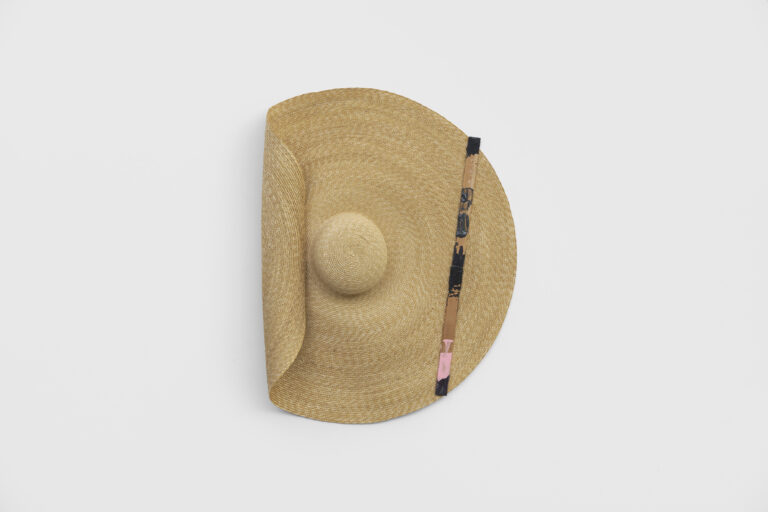Published 1 SEP 2024
It would storm
With works by Tom Burr, Manfred Pernice, Josephine Pryde, Pol Taburet, SoiL Thornton, Iris Touliatou, Valentina Triet
Opening – 13 SEP 2024, 6-10n pm
13 SEP until 2 NOV 2024

SoiL Thornton
Beginning Similarities For Sensorial Labor, Nerves aside, The Same, 2019
wooden paint stick on straw hat
81 x 60 x 11 cm
Courtesy of the artist and Galerie Neu, Berlin.
“It would storm. The stand of cumulus cloud—that city— had risen and darkened, and while he sat there he heard the percussiveness of thunder again. The de Haviland trainer was still circling overhead and it seemed to Ned that he could almost hear the pilot laugh with pleasure in the afternoon; but when there was another peal of thunder he took off for home. A train whistle blew and he wondered what time it had gotten to be. Four? Five? He thought of the provincial station at that hour, where a waiter, his tuxedo concealed by a raincoat, a dwarf with some flowers wrapped in newspaper, and a woman who had been crying would be waiting for the local. It was suddenly growing dark; it was that moment when the pinheaded birds seem to organize their song into some acute and knowledgeable recognition of the storm’s approach. Then there was a fine noise of rushing water from the crown of an oak at his back, as if a spigot there had been turned. Then the noise of fountains came from the crowns of all the tall trees. Why did he love storms, what was the meaning of his excitement when the door sprang open and the rain wind fled rudely up the stairs, why had the simple task of shutting the windows of an old house seemed fitting and urgent, why did the first watery notes of a storm wind have for him the unmistakable sound of good news, cheer, glad tidings? Then there was an explosion, a smell of cordite, and rain lashed the Japanese lanterns that Mrs. Levy had bought in Kyoto the year before last, or was it the year before that?
He stayed in the Levys’ gazebo until the storm had passed. The rain had cooled the air and he shivered. The force of the wind had stripped a maple of its red and yellow leaves and scattered them over the grass and the water. Since it was midsummer the tree must be blighted, and yet he felt a peculiar sadness at this sign of autumn. He braced his shoulders, emptied his glass, and started for the Welchers’ pool. This meant crossing the Lindleys’ riding ring and he was surprised to find it overgrown with grass and all the jumps dismantled. He wondered if the Lindleys had sold their horses or gone away for the summer and put them out to board. He seemed to remember having heard something about the Lindleys and their horses but the memory was unclear. On he went, barefoot through the wet grass, to the Welchers’, where he found their pool was dry.
This breach in his chain of water disappointed him absurdly, and he felt like some explorer who seeks a torrential headwater and finds a dead stream. He was disappointed and mystified. It was common enough to go away for the summer but no one ever drained his pool. The Welchers had definitely gone away. The pool furniture was folded, stacked, and covered with a tarpaulin. The bathhouse was locked. All the windows of the house were shut, and when he went around to the driveway in front he saw a for sale sign nailed to a tree. When had he last heard from the Welchers—when, that is, had he and Lucinda last regretted an invitation to dine with them? It seemed only a week or so ago. Was his memory failing or had he so disci730 the stories of john cheever plined it in the repression of unpleasant facts that he had damaged his sense of the truth? Then in the distance he heard the sound of a tennis game. This cheered him, cleared away all his apprehensions and let him regard the overcast sky and the cold air with indifference. This was the day that Neddy Merrill swam across the county. That was the day! He started off then for his most difficult portage.”
Extract John Cheever, “The Swimmer”, 1964
